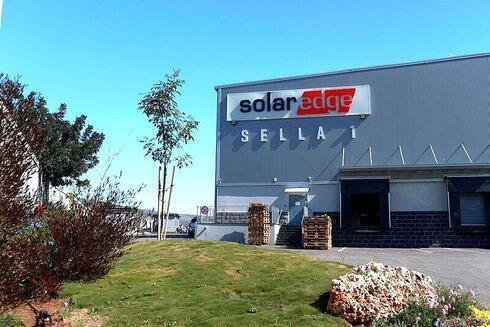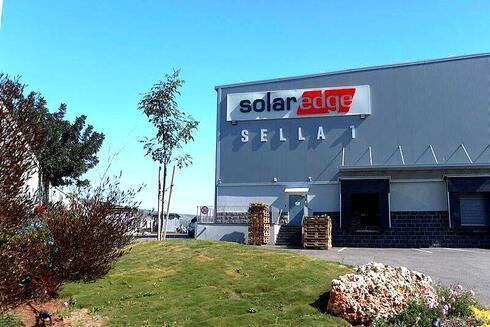
"SolarEdge has high upside potential, but the risk is accordingly high"
Despite a 96% drop in stock value, Israel's largest hedge fund believes SolarEdge has the potential to recover as demand for its products surges. However, concerns over its debt, competition, and market conditions make it a risky investment.
After plunging 96% from its peak value, does SolarEdge represent an opportunity for investors? According to Israel's largest hedge fund, Sphera, the answer is yes.
In a webinar for investors held at the end of January, the content of which was obtained by Calcalist, Amir Davidovich, an analyst at Sphera, explained that although SolarEdge has experienced what he defined as a "perfect storm" since 2022, current investor concerns about the company’s ability to continue growing while servicing its debt are exaggerated.
SolarEdge, which primarily manufactures inverters for home solar panel installations, has $628 million in debt raised through convertible bonds, which it is scheduled to repay this September. In 2024, it rolled over some of the debt by issuing additional convertible bonds, due in 2029, totaling $300 million. Sphera notes that SolarEdge will be able to service the debt by selling tax credits and liquidating its inventory.
The Perfect Storm in Europe
The main component of the "perfect storm" SolarEdge has faced is in Europe. The crisis was triggered by Russia’s invasion of Ukraine in 2022, along with restrictions on natural gas imports from Russia. In response, European countries scrambled to find alternative sources of energy and began purchasing various products in large quantities. However, energy and gas prices have since stabilized, leaving the continent with excess inventory of SolarEdge’s products. Additionally, in the U.S., SolarEdge is facing competition from Tesla, rising interest rates, and Chinese manufacturers.
“Significant acceleration in demand”
“SolarEdge dominated the U.S. market and was a significant player in the European market. The company experienced a hangover from high energy prices in 2022 following the Russia-Ukraine war,” Sphera explained. Other factors hurting the company included “Donald Trump’s election and his less-than-friendly policies on solar energy and incentives, along with increasing competition from Chinese manufacturers.” Sphera added, “We believe that after demand from Europe normalizes, we will see a real acceleration in demand for the company’s products from its customers.”
It seems that SolarEdge’s decision to sharply cut the number of employees is what led Sphera to recommend the company’s stock. In the past year, SolarEdge laid off 800 employees, completing the departure of 2,200 employees in total. The company now employs 3,000 people. “The company has not yet managed to adjust its spending rate to the new revenue situation. We think this should be the main focus of management, and we can expect additional rounds of layoffs and efficiency improvements. This is the right course of action, and it needs to happen,” Sphera told webinar participants.
SolarEdge's Stock Performance
SolarEdge shares, which are traded on the New York Stock Exchange, have fallen 81% in the past 12 months, compared to the S&P 500 index, which rose 20.6%. The company is currently trading at a value of $828 million, after reaching a record value of $20 billion in 2022. In conclusion, Sphera stated that “SolarEdge has high upside potential, but the risk is accordingly high, and therefore the recommendation should be taken with caution.” Another investor who is not afraid of risk is George Soros. According to data from the New York Stock Exchange, in the last quarter of 2024, the Soros Foundation invested $3.3 million in the Israeli company for the first time.
Strauss in Deficit Return
Another prominent recommendation from Sphera is Strauss. The company’s stock, traded on the Tel Aviv Stock Exchange, has posted a deficit return compared to the representative index, the Tel Aviv-125. In the past five years, the stock has fallen 23.4% compared to the index, which rose by 57.4%. Strauss’s substantial deficit return is attributed to “the inflation of raw materials used by Strauss in recent years. Cocoa and green coffee prices are at an all-time high, but companies in the industry have not been able to pass on the full increase in prices to consumers, neither in volume nor speed, causing profits to erode.” Additionally, a recall at the Strauss factory in 2022 resulted in a significant decrease of NIS 293 million in the company’s profits that year.
However, according to Sphera’s analysts, something has changed in the past year regarding the company and its decisions: “After years of hesitation, following social protests, Strauss is now implementing significant price increases in Israel. The most recent was about 18% on a variety of products.” Sphera adds that Strauss’s dominance in the local market will allow it to maintain high prices even after the prices of raw materials fall. “In competitive markets, changes in raw material prices are quickly translated into consumer prices. In the Israeli market, however, unfortunately for us as consumers, decreases in raw material prices are not translated with similar intensity. After raw material prices fall or stabilize, we do not expect product prices to drop quickly, which will increase Strauss's operating profit over time.”
Positive Indications for Strauss
Additional positive indications for the company’s stock, according to Sphera, include the sale of Strauss’s U.S. operations to PepsiCo for $244 million. “Focusing on what the company is best at and what generates the highest profits is the right step,” Sphera said.














